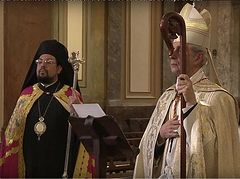Istanbul, June 2, 2020
In an effort to coordinate and foster uniformity among the Local Orthodox Churches on the issue of how to serve Holy Communion to the faithful against the background of the coronavirus pandemic and media attacks against the Church, on May 17, Patriarch Bartholomew of Constantinople sent letters to all Orthodox primates throughout the world, the text of which has been published on Romfea.
According to the Orthodoxia News Agency, the letter concerning the need to chart a common course is attributed to both Pat. Bartholomew and His Beatitude Patriarch Daniel of Romania. The Holy Synod of the Church of Greece is discussing the letter at its session today and tomorrow.
As Pat. Bartholomew notes, Local Churches have complied with the relevant quarantine decisions from their governments, closing their churches to parishioners in many cases. However, now that the faithful are returning to church in many places, variant practices on how to commune the faithful have arisen, including disinfecting the spoon between every communicant, using disposable one-time use spoons, communing the faithful in the hand, and withholding the Eucharist from the faithful until the government permits everyone to commune from the same spoon and chalice.
In certain countries, especially in Greece, there has been a media furor over whether or not to commune the faithful at all, with politicians declaring that the virus can be spread through the act of communing. A number of hierarchs of the Greek Church have spoken out against the attacks on the heart of the Church’s faith.
However, it is impossible for hierarchs to remain silent participants in such a disgraceful, unprecedented situation, Pat. Bartholomew writes.
“The condescension of the Cross reaches as far as the Cross. But it will never abandon the Cross when the Eucharist is called into question,” the Patriarch notes.
And appealing to his brother primates, he writes: “In the face of the prevailing conditions, we wish to be inspired by your fraternal thoughts and reasonings, so that, together, we can move towards a pastoral treatment of the questions of the established means of transmission of Holy Communion.”





